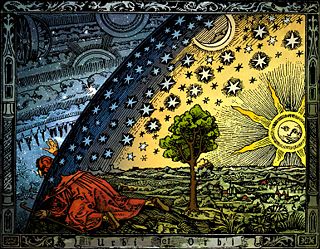Cosmos

In its most general sense, a cosmos is an orderly or harmonious system. It originates from a Greek term κόσμος meaning "order, orderly arrangement, ornaments," and is the antithetical concept of chaos. Today the word is generally used as a synonym of the word "Universe" (considered in its orderly aspect). The words cosmetics and cosmetology originate from the same root. In Russian, the word cosmos simply means space.
Contents |
Philosophy

Pythagoras is said to have been the first philosopher to apply the term cosmos to the Universe, perhaps from application to the starry firmament.
Russian cosmism is a cosmocentric philosophical and cultural movement that emerged in Russia in the early 20th century.
Theology
In theology, the term can be used to denote the created Universe, not including the creator. The Septuagint uses both kosmos and oikumene for the inhabited world. In Christian theology, the word was also used synonymously with aion to refer to "worldly life" or "this world" as opposed to the afterlife.
The cosmos as originated by Pythagoras is parallel to the Zoroastrian term aša, the concept of a divine order, or divinely ordered creation.
Olaf Stapledon, in his 1937 science fiction novel Star Maker, describes how God (the Star Maker) evolves by creating ever more complex cosmoses across multicosmic hypertime.
Another definition of the word can be "infinitely or ever expanding" and can be used in reference to that which is spiritual such as a god or spiritual force or to physical matter such as in outer space.
One philosophy that in which the cosmos or cosmic is used pertaining to BOTH theological and scientifical ideas is that of cosmicism. This philosophy, explored by writers such as H.P. Lovecraft (whom some say is the original proponent of the philosophy) and later writers whom actually represented the beliefs in books such as Hitchhiker's Guide to the Galaxy.
Cosmology

Cosmology is the study of the cosmos in several of the above meanings, depending on context. All cosmologies have in common an attempt to understand the implicit order within the whole of being. In this way, most religions and philosophical systems have a cosmology.

In physical cosmology, the term cosmos is often used in a technical way, referring to a particular space-time continuum within the (postulated) multiverse. Our particular cosmos is generally capitalized as the Cosmos.
New Age philosophy
The philosopher Ken Wilber uses the term kosmos to refer to all of manifest existence, including various realms of consciousness. The term kosmos so used distinguishes a nondual Universe (which, in his view, includes both noetic and physical aspects) from the strictly physical Universe that is the concern of the traditional sciences.
See also
- Cosmism
- Cosmogram
- Cosmology
- Cosmography
- Macrocosm and microcosm
- Cosmos (Carl Sagan's television documentary series)
- Cosmicism
External links
- Cosmos - an Illustrated Dimensional Journey from microcosmos to macrocosmos - from Digital Nature Agency
- Macrocosm and Microcosm, in Dictionary of the History of Ideas
- Encyclopedia of Cosmos
- [1]
- The Kolob Theorem by Lynn M Hilton, PhD, hiltonbooks.com